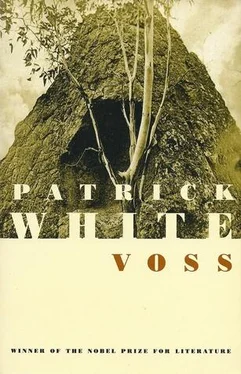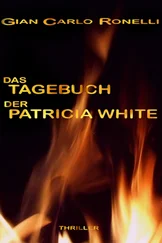Palfreyman, who had been shifting about, thought that he would turn in, and Voss, who was growing increasingly glum, agreed that this could be a solution.
‘If that is the extent of your ambition,’ said Brendan Boyle, and spat upon the floor.
His two guests got between their blankets, where they were, while himself was gone out on last errands.
The anatomy of the house was such that, by night, it resembled a warped skeleton, so that, for a long time, Voss lay looking at the stars on the other side of that cage of bones.
Meanwhile, Mr Boyle had returned to the room which he was pleased to refer to as the Bedchamber, beyond the chimneypiece, and which was the only other room of the house. He was blundering about a good deal, and making animal noises, and exploring the darkness for its distinctive grain. His bed, it seemed, was full of giggles.
Palfreyman was already asleep, but Voss continued to stare at the restless stars until he was no longer able to identify himself.
Next morning, when host and guest of honour were standing together upon the veranda, it was possible to compare the two men — at least their outward appearances, since their souls were temporarily gathered in. Now Brendan Boyle was reminiscent of the big, rude, red potatoes, the shapely ones, but hard, with the fine red dust coating them, which is akin to the patina the man had encouraged to coat those persistent traces of aristocracy. Where these lingered formally, as in the head and throat, of course he could not destroy them. There they were; it was both sickening and sad for him. But his hands, as he spoke, or on any occasion, waited, were stroking the accretion of red dust on the bare skin of his forearms. It could have afforded him some pleasure, but his eyes, which were of a cold, unchanging green, would not convey his feelings by daylight.
At his host’s side, on the rudimentary veranda, which was all splinters, just as it had been split, stood the German, also in disguise. Blackened and yellowed by the sun, dried in the wind, he now resembled some root, of dark and esoteric purpose. Whereas the first man was composed of sensual forms, intended to be touched, flesh to be rubbed against flesh, it would not be presumed to use the second except in a moment of absolute necessity, and then with extreme caution. He stood there moistening his lips, and would have repudiated kinship with other men if it had been offered. In the presence of almost every one of his companions, and particularly in the company of Brendan Boyle, he was drawn closer to the landscape, the seldom motionless sea of grass, the twisted trees in grey and black, the sky ever increasing in its rage of blue; and of that landscape, always, he would become the centre.
The two men were evidently expecting something or someone to appear. The host was balancing on the veranda’s edge and, from annoyance at being made to wait, could very easily have toppled off. The delicate wobbling of his barely controlled body made him look ridiculous.
‘I cannot recommend these blacks as infallible guides and reliable companions,’ Mr Boyle was saying. ‘Like all aboriginals they will blow with the wind, or turn into lizards when they are bored with their existing shapes. But these two fellers do know the tribes and the country for a considerable distance to the west. Or so they tell a man. Standards of truth, of course, vary.’ Then, realizing, he added: ‘But you do not know their lingo. Dugald — that is the elder feller — has a little English. But you will not be able to make much of an exchange.’
‘In general,’ Voss replied, ‘it is necessary to communicate without knowledge of the language.’
Then the two men were looking and laughing at each other insolently, their faces screwed up, their eyes splintering. Each would consider he had gained the point.
Before they had recovered themselves, two blacks came round the corner of the house. Their bare feet made upon the earth only a slight, but very particular sound, which, to the German’s ears, at once established their ownership.
‘Well, now, since they have condescended,’ said Mr Boyle, who was not really of bad temper; if he raised his voice to a bellow, it was only because he was addressing blacks, and it made his meaning clear. ‘You, Dugald, you, Jackie,’ he said, ‘I tell you this Mr Voss go far places,’ waving his arm towards the west, ‘find new country, do good all of us, black and white feller. You stick to Mr Voss do you hear, even if you drop, you old beggar.’
Then he laughed, and spoke to the men in a few phrases of their own tongue, in a very English accent, to which they listened with that same politeness with which they received intelligence in any shape or form.
The elder native was most serious and formal. He was wearing what appeared to be a very old and floury swallowtail coat, but deficient in one tail. His black skin, which had been gathered by age into a net of finest grey wrinkles, was not tramelled further, except by a piece of bark-cloth, the colour of nature, in an appropriate place. A similar piece of cloth did cover his colleague a little; otherwise, the latter was naked, of a youthful, oily skin, and flattened features. This one, Jackie, was really quite young. He stood about with the delicacy of a young girl, looking away while absorbing all details, listening with his skin, and quivering his reactions. It was not possible to address him directly, nor would he answer, but through his mouthpiece, Dugald.
In other circumstances, Voss would have liked to talk to these creatures. Alone, he and the blacks would have communicated with one another by skin and silence, just as dust is not impenetrable and the message of sticks can be interpreted after hours of intimacy. But in the presence of Brendan Boyle, the German was the victim of his European, or even his human inheritance. So he got down from the shaky step, and advanced on the old black with his rather stiff, habitual gait and said:
‘This is for Dugald.’
It was a brass button that he happened to have in his pocket, and which had come off a tunic, of military, though otherwise forgotten origin.
The old man was very still, holding the token with the tips of his fingers, as if dimly aware in himself of an answer to the white man’s mysticism. He could have been a thinking stick, on which the ash had cooled after purification by fire, so wooden was his old, scarified, cauterized body, with its cap of grey, brittle ash. Inside the eyes moved some memory of myth or smoke.
The youth, on the other hand, had been brought to animal life. Lights shone in his skin, and his throat was rippling with language. He was giggling and gulping. He could have eaten the brass button.
On an afterthought, Voss again put his hand in his pocket and offered Jackie a clasp-knife that he was carrying.
‘ Na, Junge ,’ he said, with a friendliness that could not avoid solemnity.
Jackie, however, would not receive, except by the hand of his mentor, and then was shivering with awful joy as he stood staring at the knife on his own palm.
Voss, too, was translated. The numerous creases in his black trousers appeared to have been sculptured for eternity.
As all of this scene was a bit unexpected, not to say peculiar, to Brendan Boyle, the latter was itching to cut it short.
He jabbed with a finger in the old man’s shoulder-blade, and said:
‘Plenty valuable button. You take good care.’
After which, he spat, and was easing his clothes.
Boyle then proposed to Voss that they should spend the morning inspecting the sheep and goats he had selected for use of the expedition, and which would probably be found somewhere in the vicinity of a string of waterholes a mile or two north of the homestead. Voss agreed. It soon became clear that he and his host were continually humouring each other. In this way each hoped to hide the indifference he felt towards his companion, though each remained humorously aware that the other was conscious of his attitude. The agreeable part was that neither harboured actual dislike. No one could have disliked Brendan Boyle in spite of his peculiarities, and he was quite incapable of disliking for long anyone but himself.
Читать дальше












